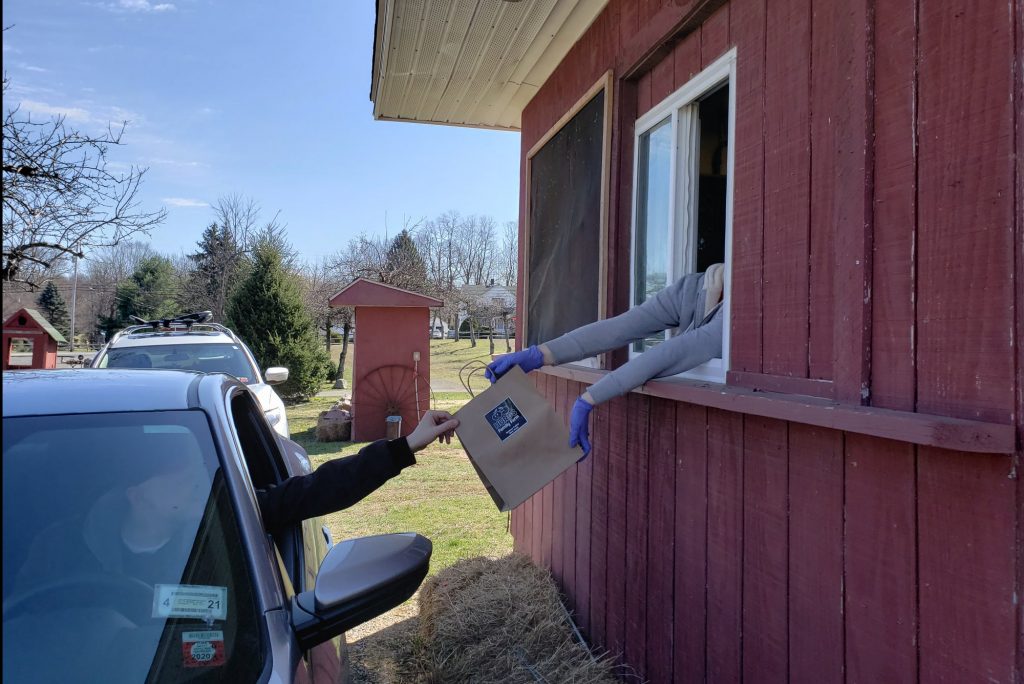COVID-19 forces changes in the farmer’s market
COVID-19 forces changes in the farmer’s market

Local farmers are doing their best to fight back against COVID-19 by offering citizens an alternative to grocery stores. On Friday April 5, Hurds Family Farm opened a drive-through where locals can pick up their online orders from an employee wearing latex gloves as the two parties fully stretch out their arms in order to maintain social distancing.
The farm’s manager, Sarah Potenza, was reluctant to open the drive-through initially because of Hannaford offering a to-go option. Eventually, their local Hannaford ended that policy, limiting locals to entering the grocery store and risking infection. Potenza wanted to help. “Our goal of doing it was really so that we save somebody the trip of going in the grocery store and really limit the points of contact for people, especially the ones that are of high-risk,” she said.
They work with Hudson Valley Harvest, other local farms, and the local meat market to sell a wide variety of food. If it is produce that is not grown this season or in this area, such as bananas, then Potenza sends an employee to the grocery store to get it. The market does not just limit itself to produce. They sell hand sanitizer as well as toilet paper, both of which have notoriously become hot commodities due to the pandemic.
When asked if this is profitable, Potenza scoffed at the notion, saying that the drive-through was an act of community service. “We could have probably put higher prices on things and forced people to pay more and maybe make some sort of high profit, but that’s not what we are looking to do here,” she said. “We understand that there’s a lot of people in tough situations and that are out of work right now, so our main goal was just keeping people safe and giving them an option that’s safer than the grocery store.”
Local farms, like the one Potenza manages, are getting a lot of help during this crisis from the Cornell Cooperative. The organization fosters the agricultural community by providing resources such as research from the university as well as running programs such as 4-H. They provide a free service with what they call educators who act as liaisons between local farmers and researchers at the university to facilitate communication.
Tara Kleinhans, the director of communications for the Cornell Cooperative Extension of Ulster County, found an old map that was created by UlsterCorps that included local farms, food pantries and farmers’ markets. Kleinhans took the initiative and worked with UlsterCorps to update the map.
“When I found that resource, I realized that it would be really useful in this time because our local food economy is stretched thin at this point,” she said. “With COVID, the grocery stores’ shelves are emptying, and people are looking for alternative sources of food. I know that some of our farmers are open and willing to feed the community.”
Along with the map, Kleinhans provided a bunch of resources for the community regarding COVID-19 including guidance on applying for loans/disaster funding, creating online shops, handling food and farmers’ markets. She hopes that farmers will be able to use these resources in a way that is not only beneficial to themselves but also to the community at large.
Cornell Cooperative has also increased its reach via remote classes such as an online backyard chickens class during a time where, according to a New York Times article, a lot of people are buying chickens. The class saw over 200 participants which left Kleinhans pleasantly surprised. She said that usually a meeting like that only garners around 20 people. This new wave of online participation has left an imprint on the organization as Kleinhans hopes to continue remote access to these kinds of programs even after the pandemic.
But there is still much uncertainty upon the horizon as peak season for farmers here in New York is not yet upon us. Kleinhans fears how the travel ban might affect employment during that peak season and hopes that perhaps those who have lost their jobs to the pandemic could fill those jobs on the farms.
Potenza also expressed some concern of other farmers who might be struggling. “A lot of the reason people come out to farms is because they6 want to be out in the fresh air and they want to pet the animals and they want to experience things,” she said. “I think, because of COVID, those experiences have been taken away, at least temporarily, which I think puts a lot of farmers in a tough situation.”
Mike Boylan of Wright’s Farm said that their next big harvest is strawberries in June and that he won’t know what to do until then. “As everybody in farming, you are always ready for the unexpected, so we just have to figure out what we’ll do as we go along,” he said.





